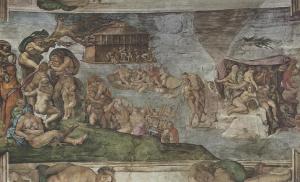
A quick scan of the Bible gives us several ways of understanding the term “heaven.”
- The dwelling place of God (“Our Father, who art in heaven..”)
- The abode of created angels (“In the beginning, God created the heavens…” “War broke out in heaven; Michael and all his angels fought against the dragon.”)
- The sky, or firmament, or visible “upper edge” of the earth (“The heavens declare the Glory of God…”)
- The destination of the righteous (“Unless you change and become like children, you will never enter the kingdom of heaven.”)
Heaven as the Limit of Perception
Without arguing against any of those senses of the term, I’d like to start in a different place. When John the Baptist sees Jesus, he says, “the kingdom of heaven has come near.” This was a strange thing to say, since those who looked up saw a normal looking Jewish man walking their way. What if we begin there? Heaven is a way of seeing, receiving, and experiencing a particular Jewish body. Further, if we let that moment of the gospel guide us, we could say that heaven is the creator’s presence right when it “comes near” in created things.
But which created things? Maximus the Confessor says that heaven is “the boundary and limit of all that is perceived by the senses.” I want to take one particular word seriously: all. What if heaven is what we call the excessive depth of contemplation, when we turn our Christ-formed attention to anything at all?
I have written before about what Maximus has taught me about contemplative prayer. What I’m wondering this morning is whether a deep contemplation of even unpleasant things can take us to this boundary. Can sitting with earth’s ugliness bring heaven near? The gospels suggest that it can, especially when they tell the ugly story of the cross. Heaven has come near there too. What would it look like to let daily ugliness open heaven’s gates?
Cold Steel Truth
Journalist and novelist Ta-Nehisi Coates tells the painful story of his youth in the racially segregated streets and schools of Baltimore. Coates is a Black man, and about a month older than me. When I was canoeing on the river in central Indiana with a friend, he was learning what it means to see a teenager pull a gun out of a jacket pocket.
Coates tells of writing assignments his mother gave him in those years. She taught me, he says, “to write, by which I mean not simply organizing a set of sentences into a series of paragraphs, but organizing them as a means of investigation. When I was in trouble at school (which was quite often) she would make me write about it.”
Mrs. Coates’s prompts to her son became opportunities for contemplation. She made him sit with those moments that other kids like me never had to experience. He dug through his own easy reactiveness until a deeper and more difficult perception emerged. Learning to write became for him a way of “processing my thoughts until the slag of justification fell away.” When that happened, his writings led him to unadorned truth. “I was left with the cold steel truths of life.”
How Heaven Comes Near
Sitting with the hard moments formed him. His book, written as a letter to his own son, is a relentless wrestling match with things that appear to be true, as he asks deeper and harder questions about false justifications.
Is Ta-Nehisi Coates exploring the limit of what his senses can perceive? Is he taking us to Maximus’s heaven?
Mrs. Coates’s prompts do not follow Maximus’s prompts for contemplating a passage of scripture, an object, or an event. They do not, at least as he names them here, call for a consideration of divine things. He doesn’t tell us whether or not his mother thought them up while considering the God of the Incarnation.
Still, what those contemplative prompts did seems not entirely different. They invited him to look at bodily experience, not be distracted by the first glance, and find the deep hard truth that wanted to emerge. That sounds to me like John pointing at his cousin and saying, “heaven.”
Contemplative theology invites us to perceive all of life with the faith that God is the creator and redeemer of every moment. This is the way that even painful experience can catch us up —rapture us, you might say—into God’s presence. It’s how heaven comes near.
Heavenly Now
Christian worship, at its fullest, attunes itself to this “heavenly now” kind of perception. Surrounded by scripture, song, art, and candle flame, you find yourself wondering if heaven has come to earth. Your sibling, who a second ago was annoying you, could be one of the saints or even angels singing beside you. The hard moment of life that waits for you by the door hasn’t disappeared, but instead has opened up onto a deeper truth. It has brought you to the divine depths that lie in every moment of time.
Those divine depths are the goal of all Christian contemplation. And while I wouldn’t presume to tell Coates what he was contemplating in his mother’s prompts, it doesn’t look that far off to me. Sitting with a moment of embodied life long enough for cold steel truth to emerge? That’s one of the ways—and a theologically generative one, I’d say—that Christians understand the word “heaven.”















